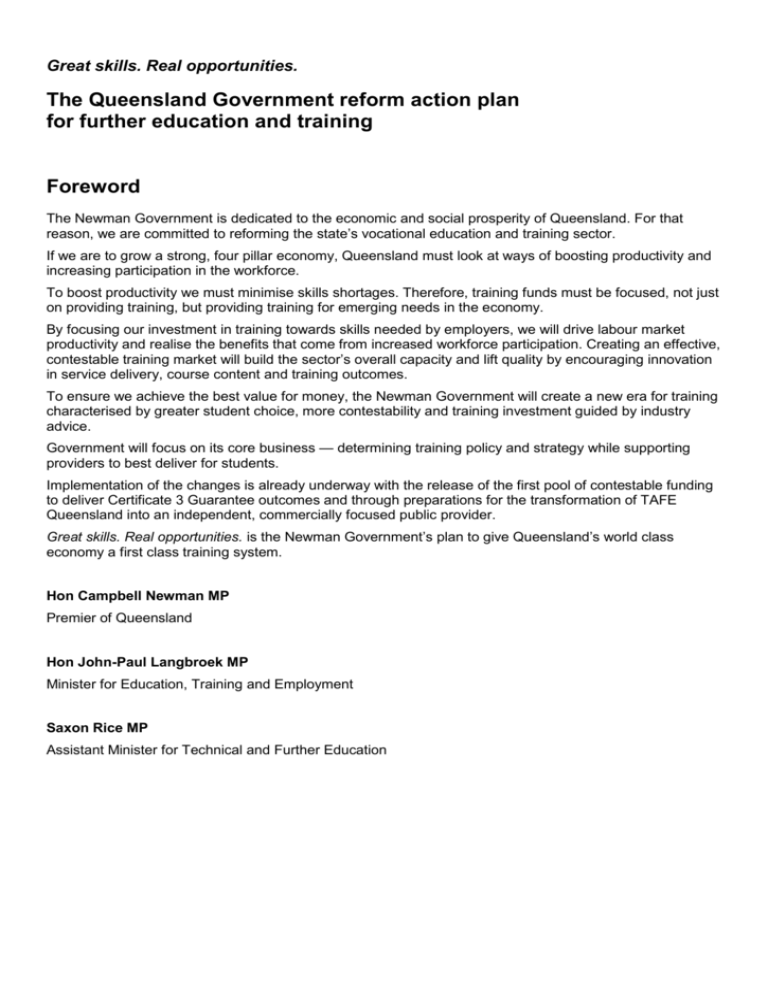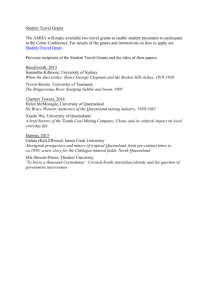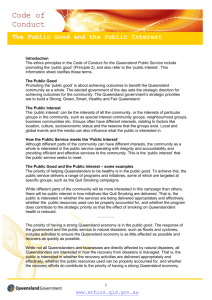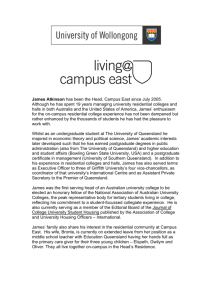View as RTF
advertisement

Great skills. Real opportunities. The Queensland Government reform action plan for further education and training Foreword The Newman Government is dedicated to the economic and social prosperity of Queensland. For that reason, we are committed to reforming the state’s vocational education and training sector. If we are to grow a strong, four pillar economy, Queensland must look at ways of boosting productivity and increasing participation in the workforce. To boost productivity we must minimise skills shortages. Therefore, training funds must be focused, not just on providing training, but providing training for emerging needs in the economy. By focusing our investment in training towards skills needed by employers, we will drive labour market productivity and realise the benefits that come from increased workforce participation. Creating an effective, contestable training market will build the sector’s overall capacity and lift quality by encouraging innovation in service delivery, course content and training outcomes. To ensure we achieve the best value for money, the Newman Government will create a new era for training characterised by greater student choice, more contestability and training investment guided by industry advice. Government will focus on its core business — determining training policy and strategy while supporting providers to best deliver for students. Implementation of the changes is already underway with the release of the first pool of contestable funding to deliver Certificate 3 Guarantee outcomes and through preparations for the transformation of TAFE Queensland into an independent, commercially focused public provider. Great skills. Real opportunities. is the Newman Government’s plan to give Queensland’s world class economy a first class training system. Hon Campbell Newman MP Premier of Queensland Hon John-Paul Langbroek MP Minister for Education, Training and Employment Saxon Rice MP Assistant Minister for Technical and Further Education The skills and training landscape Queensland’s publicly funded training sector is a strong and dynamic system, training around 300 000 students each year through a network of more than 500 contracted training providers. 1 Queensland has the second highest contestable training market in Australia.2 The take up of higher level training has been strong with 77 per cent of students in Queensland undertaking training at the certificate III level and above, significantly above the national average of 68 per cent. 3 Most students and employers are highly satisfied with the training they receive4 and Queensland continues to train more Vocational Education and Training (VET) in Schools students than any other state.5 However, the sector also faces some challenges. Queensland trains fewer people as a percentage of the working-age population than any other state or territory.6 Government and non-government investment in training remains low by national standards,7 which is compounded by a relatively high cost of training delivery.8 The future In a dynamic economy, the skills needs of industry are continually changing and the very make up of Queensland industry is changing. Demand for skills in occupations linked with growth sectors will continue to increase and higher-skilled qualifications will be sought by employers who are seeking competitive advantage through an innovative workforce.9 Revitalising Queensland’s further education and training sector The changes being made to Queensland’s further education and training sector are comprehensive and will work together to bring about lasting reform. Below are the key reforms in an ambitious program of change for Queensland’s further education and training sector that will support Queenslanders to access and complete the skills training they need to get a job and contribute to the state’s economy and their own prosperity. Engaging industry and employers in a partnership to match training to employment Genuine partnership between industry, employers and government will ensure the skills needed for economic growth are identified. A Ministerial Industry Commission will directly advise government on the priorities for funding qualifications that match training with job opportunities. The Commission will be supported through a dedicated secretariat. The state’s new VET investment framework will provide clear information on priority skills and funding arrangements, based on advice from industry and employers, and will create certainty for providers. For the first time, skills investment will be fully contestable in mid-2014, with a focus on courses and qualifications that are most likely to lead to employment for graduates. Contestability means opening up training delivery so it can be offered by a range of private and public providers. Making training funding available contestably ensures that the government is providing the public with greater choice and the best possible solution at the best possible price. High priority training will receive a higher government contribution meaning that student fees for priority courses are likely to be lower. Tailored programs that support skills development for particular industries, locations or student cohorts will enable government to respond to emergent skilling needs while encouraging co-investment by employers. TAFE Queensland assets will be transferred to a specialist management entity so that the public provider can focus on its core role of training delivery. Public training assets will be available for use by public and private providers in new and dynamic ways to ensure all providers have access to infrastructure that enables delivery of quality training. Pathways from school to work will become more effective through revised VET in Schools arrangements that will focus on preparing senior school students for further training and employment. Accessible to all Queenslanders The Certificate 3 Guarantee will give Queenslanders access to a government subsidised training place, up to and including their first certificate III level qualification in priority training areas. Year 12 graduates will be able to enrol in fee-free priority training courses. Learners with diverse needs will benefit from additional funding from government to ensure that those who need it most are able to access training. The delivery of foundation skills, including language, literacy and numeracy and other workplace preparation skills is a critical component of the Certificate 3 Guarantee. A new five-year $47 million Community Learning Program will provide additional support for Queenslanders experiencing a high level of disadvantage to gain a qualification. Comprehensive career and training information will be available through a new website that will provide a one-stop-shop for students to plan their career and choose a course and provider. Students will be able to clearly see which courses are considered a priority by government, industry and employers, and make an informed choice on what suits their personal circumstances and which qualifications are most likely to lead to employment. Students will also be able to see the government contribution (and student contribution where applicable) for each training course and will be able to access information about financial and other support that might be available. Employers and others will also benefit from the information on the website, including practical ways to plan their workforce and develop staff. Quality training linked to employment outcomes Selected quality training providers will be able to offer approximately $300 million in government subsidised training in contestable User Choice and other funding, including a new $42 million funding pool. From 1 July 2014, all government subsidised training will be delivered contestably, giving students an even greater choice of training provider. Increased choice for consumers will improve the quality of training delivered by providers that are competing on a level playing field. Only those providers that deliver a consistently high standard of training will be able to deliver government subsidised training. Funding agreements will focus on outcomes to give longer term business certainty to providers and help build innovation and diversity in the market. Having graduates move into employment at the completion of training is a key priority for government. Apprenticeship and traineeship arrangements will be improved, making it easier for apprentices and trainees to change employer and move interstate without compromising their progress towards becoming a qualified tradesperson. Administration will be simplified and streamlined, reducing paperwork and red tape. Apprenticeships and traineeships will continue to be funded through the contestable User Choice arrangements which enable employers and their apprentice or trainee to choose the training provider that best suits their needs. Delivering actions to reform further education and training The way it was The way it will be Broad industry engagement arrangements with limited direct influence over government’s investment decisions. Government and industry — small, medium and large — working in partnership to identify the priority skills for the economy. Partial alignment between government’s investment in training and the skill needs of employers and the economy. Government’s training investment is directed towards priority courses identified as leading to employment or career development. Opaque arrangements for use of public training funds, including funding provided to TAFE Queensland. Transparent funding arrangements and greater certainty through the publication of skill priorities and the level of public investment. Participation in VET lower than national average with little incentive for training for employment. Certificate 3 Guarantee will enable every Queenslander to access their first subsidised certificate III qualification in priority courses. Rigid student fee structure controlled by regulation that did not incentivise training priorities. Flexible student contribution and government purchasing arrangements providing incentives for students to undertake training in priority courses. Queenslanders with diverse needs not always receiving enough support. Queenslanders with diverse needs encouraged to participate in training and supported to succeed. A complex, rigid apprenticeship and traineeship system difficult to access and navigate. A simpler, streamlined system consistent with national guidelines featuring flexible industry-endorsed approaches to trade training. Pathways between the educational sectors and to employment often difficult to navigate. Connections formed between school, further education and training that help young people transition to employment. Most government subsidised training offered through TAFE Queensland. A contestable training market with training delivered by high quality training providers. Contract quality and compliance measures limited to the User Choice program. Longer term arrangements that provide greater business certainty for providers. Limited career, course and training provider information available to students and employers. Easily accessible and comprehensive information available from a single website allowing students to research career options, identify courses, compare and contrast training provider options and determine course costs. TAFE Queensland hindered by high operational costs, declining market share and inflexible structural arrangements. An independent, commercially focused public provider with a clearly defined role and purpose, responsive to local and state-wide skills demands. Ageing, under-utilised, ill-suited TAFE infrastructure, with limited capacity to invest in training facilities. Specialist asset management separate from TAFE Queensland, and reinvestment in training and modern facilities that are available for use by private and public providers. Reform actions Industry, employers, providers, students, apprentices and trainees are at the heart of the further education and training sector. Key reforms for each key stakeholder group are outlined in the following pages. Industry and employers Government, industry and employers must partner effectively to meet the challenge of matching training to employment opportunities Action area 1.1 A genuine partnership Establish the Ministerial Industry Commission to advise the Minister on skilling and funding priorities. Create a genuine partnership between industry, employers and government through a new strategic engagement framework that will give industry and employers genuine input into how public training investment is made. Make sure the contestable market delivers the outcomes needed by the economy and that reform of the sector is implemented effectively. Streamline existing industry consultation arrangements, reduce duplication and improve regional information forums to give small, medium and large industry a voice. Inform small, medium and large enterprises about the multiple ways they can provide advice to government. Work with industry to stimulate confidence in, and demand for, accredited training. Action area 1.2 Transparent investment in skills for the economy Implement the government’s new, transparent VET investment framework that underpins the joint investment in skills by government, industry, employers and participants. Purchase training that will provide students with skills needed by the economy and that will lead to employment or progress their career. Increase quality and choice of provider by making funding available contestably. Make skills recognition for existing workers easier through a new, straightforward online skills identification tool. Action area 1.3 Employing apprentices and trainees Government’s commitment to structured trade training is clear — investment of an additional $86 million over six years to create an extra 10 000 apprentice and trainee commencements. Encourage successful school to full-time work transitions through trade employment incentives including the $10 million School to Trade Pathway that will give employers a $5000 bonus for retaining their school-based apprentice in full-time work after they leave school. Work with industry and employers to identify appropriate pre-apprenticeship career planning for industry sectors. Reduce barriers to attracting and retaining apprentices through nationally consistent regulation arrangements. Make it easier to take on, train and retain apprentices and trainees through simplified, streamlined administration and online processing. Enable complementary, flexible trade training pathways for a broader range of industries. Make gaining trade recognition easier for casual and other employees through the Registered Trade Skills Pathway and other initiatives that will complement existing trade pathways. Assist employers to take advantage of flexible trade training pathways that will provide high quality trade outcomes tailored to the needs of industry by refocusing the role of departmental regional staff. Review and improve contestably delivered apprenticeship and traineeship training to ensure ongoing certainty for students, employers and providers. Action area 1.4 Workforce planning and development Employers will be supported to build on their current workforce strengths and capabilities, plan development opportunities and access the training they need through locally available assistance. Address critical skill shortages through a new Industry Partnership Strategy that will require industry and employer co-investment in targeted government subsidised training. Help small to medium regional employers develop workforce plans and access the right training for their workforce through the $3 million Regional Workforce Development Initiative. Providers Making funding contestable and fostering diversity in the training market will deliver high quality training outcomes directly linked to employment. Action area 2.1 Fully contestable training market Queensland’s training market is robust and diverse. Better value for money can be achieved through contestably purchasing training into the future. July 2013 — create a pool of $300 million in contestably delivered training, including a new $42 million funding pool as the first stage in opening up the training market to full contestability. July 2014 — all government funded training will be delivered contestably, including User Choice and other government subsidised training. Action area 2.2 Long term partnerships with providers Training providers will be encouraged to deliver innovative, value for money training outcomes. Existing User Choice processes will be expanded to all contestably funded training. Guarantee funding arrangements with preferred training providers, giving certainty for providers and their students through longer term agreements focused on outcomes. Publish the level of government contribution for every priority course. Ensure better value for money by annually reviewing the effectiveness of the new VET investment framework. Make working with government easier by assigning a customer service representative to every agreement. Ensure government purchased training complements existing fee-for-service markets. Action area 2.3 Maximising use of public training infrastructure Government will invest in training infrastructure that better meets the needs of students and industry and can be accessed by more providers. Free up public training infrastructure for use by public and private providers. Transfer TAFE asset ownership to a specialist entity with appropriate asset management skills and expertise to allow TAFE Queensland to focus on its core role of training delivery. Reinvest in training and infrastructure for use by all training providers with the proceeds from the sale of TAFE Queensland assets. Action area 2.4 Greater business certainty To ensure increased business certainty for providers, government decision-making will be more transparent. Publish a range of key documents online to provide clarity for providers, industry and students: o Annual Skills Priority Report detailing short, medium and long term workforce development and skill requirements o Annual VET Investment Plan to inform stakeholders of government’s VET investment priorities o key research, policies and advice that informs the Ministerial Industry Commission’s market oversight role o Annual Skills Highlight Report outlining key achievements. Give greater business certainty by providing the market with early advice on proposed government policy changes. Action area 2.5 Linking training to employment Matching training with jobs will be a fundamental deliverable from the training market. Engage preferred training providers that build and maintain links with industry and employers to provide meaningful job outcomes for training graduates. Investigate ways to appropriately recognise providers that achieve genuine employment outcomes for graduates. Encourage diversity in the further education and training market by working with providers that deliver training in the workplace, online and in innovative ways to meet the needs of students and employers. Action area 2.6 Training for all Queenslanders Learners with diverse needs will receive assistance to make the most of their training opportunities. Ensure government preferred training providers are aware of Queensland’s framework for assisting providers to embed inclusive learning practices in training – VET Inclusive Learning: A Way Forward. Provide access to specialist teaching, learning resources and support to ensure providers can help students with diverse needs complete their training. Action area 2.7 Recognising the professional standards of trainers and assessors Quality training outcomes rely on the professionalism and expertise of VET trainers and assessors who must also hold specialised vocational qualifications. Work with providers, unions and the sector to develop standards of accreditation for Queensland trainers and assessors. Create voluntary accreditation arrangements from 2016 for Queensland trainers and assessors. Ensure application and registration fees are not a barrier to the recognition of training professionals. Action area 2.8 Creating a stronger TAFE Queensland Over the next five years the public provider will be reformed to ensure that TAFE Queensland will be competitive, responsive, innovative and flexible. Establish TAFE Queensland as an independent statutory body with a commercial focus from 1 July 2013. Clearly define the role, purpose and strategic direction of TAFE Queensland. Create seven amalgamated TAFE Institutes. Finalise the membership of the TAFE Queensland Board for appointment by July 2013. Develop a strategic asset plan to identify better ways to use public training assets in the future. Use the proceeds from asset disposal for investment in training and in modern, attractive learning environments that will be available for use by all providers. Make funding arrangements transparent during the transition to a more contestable training system and continue to monitor the effectiveness of the changes to TAFE and the sector. Action area 2.9 Enhancing international education and training Promoting Queensland training and education products and services internationally is an investment in the state’s future growth. Strategies that encourage onshore and offshore participation in further education and training can also benefit the schooling and tertiary education sectors. Create an international education and training advisory group to provide advice to government on key issues relating to the industry in Queensland. Develop long-term strategy and programs to ensure Queensland’s international education and training industry is responsive, robust and sustainable. Promote international student engagement and support including exploring options for scholarships to Queensland for international students. Develop a program of offshore visits focusing on potential areas of growth for Queensland’s international education and training industry. Advocate Queensland’s position on Australian international education and training policy particularly with respect to those policy issues that are having an adverse impact on the sector. Examine education export opportunities for Queensland in growth areas, particularly as Asia’s middle class consumers emerge as the world’s largest market. Facilitate collaboration between training providers, universities, schools, peak bodies and industry to maximise opportunities for Queensland’s participation in international education and training. Students, apprentices and trainees By linking training to employment, students will have access to high quality training that will increase their social and economic prosperity. Action area 3.1 Government funding follows the student Government will focus its investment on training qualifications that will lead to employment. Give every Year 12 graduate an extra incentive to enrol in high priority qualifications by offering fee-free training if they start training with a preferred provider within a year of leaving school. Encourage more Queenslanders to take up training by providing skilling opportunities across a range of industry areas that are critical to Queensland’s economy through the Certificate 3 Guarantee. Improve student choice and training quality by making government subsidised training available through more quality providers across the state. Enable prospective students to choose a provider with a proven track record of graduates gaining employment or advancing their career after training. Help reduce the up-front cost of training through expanded Australian Government VET-FEE-HELP arrangements for government subsidised diploma, advanced diploma and selected certificate IV qualifications through approved providers. Action area 3.2 Skills for life and for employment Learners with diverse needs will be provided with skilling pathways that enhance their career prospects and their economic and social wellbeing. Provide support services to learners with diverse needs to help them start and complete their training through the new five-year $47 million Community Learning Program by: o enabling participants to gain accredited foundation skills, including language, literacy and numeracy training, and develop employability skills like workplace communication, teamwork, customer service and basic workplace health and safety o working with training providers to ensure that learning is relevant and leads to further training and employment pathways. Action area 3.3 Making training information easy to access and understand Career development and training information for students and employers must make navigating the training system more straightforward. Make career planning and choosing a course and provider easier through a comprehensive new website. Enable Queenslanders to access an online, self-guided tool that will help them move into further education and training to formalise recognition of their existing skills. Action area 3.4 Making trade training more flexible and relevant Apprenticeship and traineeship training is an important entry point to most trades in Queensland. Enable unqualified adult workers to gain a qualification and trade outcome through flexible pathways including the new Registered Trade Skills Pathway. Encourage more apprentices and trainees to improve their literacy and numeracy skills through selected training providers accessing government’s $5 million support program. Provide $3 million in incentives to group training organisations to employ additional apprentices. Action area 3.5 Pathways from school to employment Vocational training programs in schools have an important role in helping young people to choose a career and take their first steps towards full-time employment. Create genuine pathways from school-based apprenticeships to full-time employment after school through the $10 million School to Trade Pathway. Target further education and training funding towards industry endorsed pathways suitable for delivery in schools to ensure VET in Schools prepares students to step into employment. Increase opportunities for school to work transitions by having departmental regional officers help build links between schools and local employers. Improve career and training information available to schools, students, parents, employers and other stakeholders through online information and increased contact with schools by regional officers. Work with schooling sectors to develop actions that focus on the literacy, numeracy, ICT and employability skills of senior students. Conclusion Great skills. Real opportunities. will deliver genuine, sustainable reform of Queensland’s further education and training sector to ensure that Queenslanders are skilled for employment. Reforms commenced in 2013 with roll out continuing over the next five years. Implementation of the reforms by the Department of Education, Training and Employment will be overseen by the Ministerial Industry Commission and the Minister for Education, Training and Employment. The international education and training advisory group will be developed in consultation with Trade and Investment Queensland, which is the lead agency for the international marketing of Queensland’s education industry. The reform action plan will be reviewed and updated in 2015. End notes 1 National Centre for Vocational Education Research (NCVER) 2012, Australian vocational education and training statistics: students and courses 2011, revised August 2012, Tables 1 and 14, NCVER, Adelaide. 2 Productivity Commission 2013, Report on Government Services 2013, Volume 1, Chapter 5 Vocational education and training, Attachment tables, Table 5A.8 (2011 results), Commonwealth of Australia, Melbourne. 3 Productivity Commission 2013, Report on Government Services 2013, Volume 1, Chapter 5 Vocational education and training, Attachment tables, Table 5A.5 (2011 results), Commonwealth of Australia, Melbourne. 4 Productivity Commission 2013, Report on Government Services 2013, Volume 1, Chapter 5 Vocational education and training, Attachment tables, Table 5A.64 and 5A.90 (2011 results), Commonwealth of Australia, Melbourne. 5 Department of Industry, Innovation, Climate Change, Science, Research and Tertiary Education 2013, Training.gov.au, Commonwealth of Australia, Canberra, <http://training.gov.au/>. 6 Productivity Commission 2013, Report on Government Services 2013, Volume 1, Chapter 5 Vocational education and training, Attachment tables, Table 5A.9 (2011 results), Commonwealth of Australia, Melbourne. 7 Productivity Commission 2013, Report on Government Services 2013, Volume 1, Chapter 5 Vocational education and training, Attachment tables, Table 5A.2 (2011 results), Commonwealth of Australia, Melbourne. 8 Productivity Commission 2013, Report on Government Services 2013, Volume 1, Chapter 5 Vocational education and training, Attachment tables, Table 5A.19 (2011 results), Commonwealth of Australia, Melbourne. 9 Australian Workforce and Productivity Agency 2013, Future Focus 2013 – National Workforce Development Strategy, Commonwealth of Australia, Canberra.







